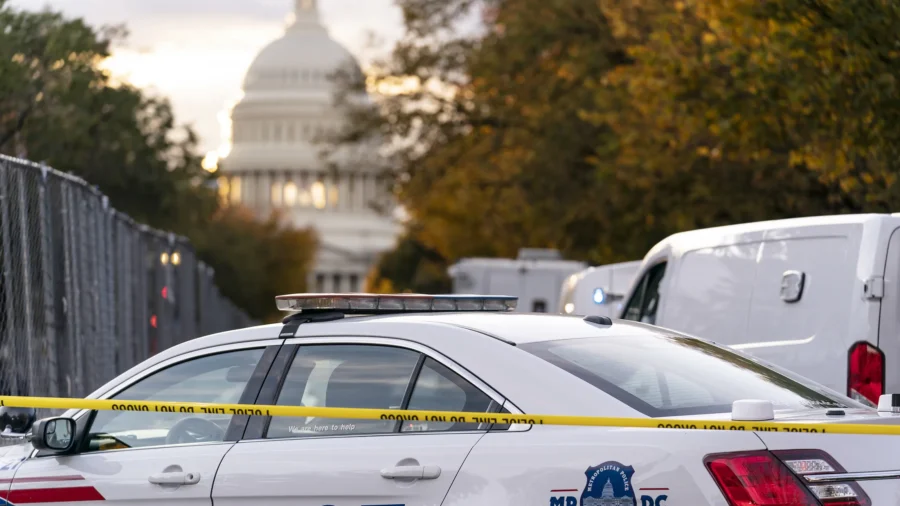The Council of the District of Columbia passed a crime prevention omnibus bill on Tuesday evening, advancing measures aimed at reversing rising crime trends.
The 13-member council, which serves as a legislative body for the District of Columbia, voted overwhelmingly in favor of the bill, dubbed the Secure DC Omnibus Amendment Act of 2024. In all, 12 members voted in favor of the bill, while Ward 8 Council member Trayon White voted “present.”
As its name suggests, the bill covers a range of provisions intended to deter crime in the nation’s capital. Among the provisions, the bill establishes a new category of felony offense for “organized retail theft,” describing instances where two or more individuals act to steal items with a combined value greater than $1,000 aggregated over a 90-day period, with the intent to sell or barter these items for monetary gain or fraudulently return them to a retail merchant.
The omnibus crime bill also expands the city’s legal definition of carjacking to include instances where a victim is within the line of sight of their car or close enough that a perpetrator can snatch the victim’s keys and then “take immediate possession” of the car.
The crime bill also revives the city’s 90’s-era anti-loitering provisions and drug-free zones. Other provisions in the bill raise penalties for firearm-related offenses.
The bill also redefines prohibited chokeholds from techniques that cause “a loss of consciousness” to those that cause “a protracted loss of consciousness.”
These measures come forward at a time when the D.C. Metropolitan Police Department recorded a 35 percent increase in homicides, 67 percent increase in robberies, 82 percent increase in motor vehicle thefts, and 39 percent in overall violent crimes in the nation’s capital from 2022 to 2023.
With the D.C. Council’s vote on Tuesday, the bill now goes to Democrat D.C. Mayor Muriel Bowser, who could sign it into law.
The omnibus crime bill’s sponsor, Ward 2 Council member Brooke Pinto, credited her fellow council members with taking a “decisive action to make our communities safer and more secure.”
“The Council’s passage of my Secure DC legislation sends the clear message that DC is united in its efforts to make meaningful and sustainable improvements to public safety by preventing crime, ensuring accountability, and improving government coordination and response,” Ms. Pinto continued in a Tuesday evening statement. “I am proud of the collaborative process that has culminated in this monumental moment, and I am grateful to the thousands of residents, businesses, experts, and colleagues who participated at public hearings, joined public safety walks in all eight wards, and met with me to share their calls for action, advocate for change, and shape this landmark public safety legislation. Residents, visitors, and businesses across the District deserve to be safe.”
Mayor Praises Crime Bill’s Passage
While Ms. Bowser has yet to fully enact the omnibus crime bill, she has already credited Ms. Pinto and the other council members for their work advancing the measures.
“Passing and implementing Secure DC is a critical step in the work to build a safer DC by rebalancing our public safety and justice ecosystem in favor of safety and accountability,” Ms. Bowser said in a Tuesday press statement. “Today, I am grateful for all the people who made their voices heard and demanded action. I am grateful for the leadership of Councilmember Pinto and all the councilmembers who listened to the concerns of our community and voted in support of common-sense legislation that recognizes the importance of accountability in our ecosystem.”
The D.C. mayor said other emergency crime measures approved last summer have already helped to counter the rising crime trends.
“We are a city that is committed to creating opportunity and that believes in second chances, but we will not tolerate violence and we will not tolerate criminal activity that disrupts our sense of safety and our ability to build thriving neighborhoods,” Ms. Bowser added.
Crime Bill Sees Pushback
The omnibus crime bill has caused some division in the otherwise reliably Democrat-voting city.
The American Civil Liberties Union (ACLU) of D.C. criticized some of the bill’s provisions, such as measures that bar people from wearing masks to conceal their identity when engaging in conduct prohibited by civil or criminal law.
“Allowing police to stop people in masks and face-coverings simply because an officer suspects bad behavior would enable police harassment, not prevent crime,” ACLU-D.C. Policy Counsel Melissa Wasser said in a Monday press statement.
Ms. Wasser said the drug-free zones described in the bill would also “open the door for police officers to harass people and violate our rights.”
Another source of controversy in the bill was a provision that would allow local authorities to collect DNA and share those samples in a national database without having to wait for a conviction. Some council members opposed the DNA collection provisions, and Ms. Pinto also offered an amendment with what she described as a “compromise version” of the DNA collection provisions, stipulating that DNA could only be shared in a national database after a probable cause finding and only for offenses involving dangerous crimes, crimes of violence, or sexual abuse. The bill also includes provisions to expunge DNA records from the national database in instances where a case is dismissed, vacated, acquitted, or pardoned.
Though Ms. Pinto offered an amendment, ACLU-D.C. signaled support for removing DNA collection provisions from the bill altogether.
Speaking on Tuesday before the bill’s final, At-Large Councilmember Kenyan McDuffie thanked Ms. Pinto for offering to make some changes to the DNA provisions but said, “It’s really still not in a place where I’m comfortable supporting it.”
Mr. McDuffie argued the DNA collection provisions would “almost exclusively burden black residents,” who he said represent about 47 percent of the city’s population but about 90 percent of its arrestees.
Ms. Pinto’s amendment on the DNA collection provisions was passed on Tuesday but with opposition from Mr. McDuffie, Mr. White, and Ward 4 Councilmember Janeese Lewis George.


